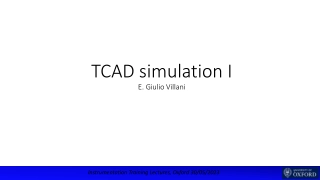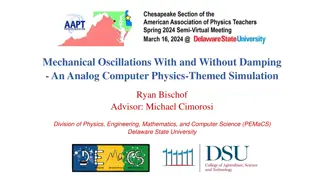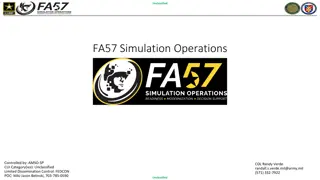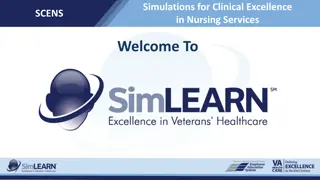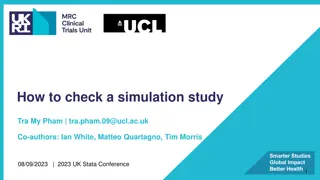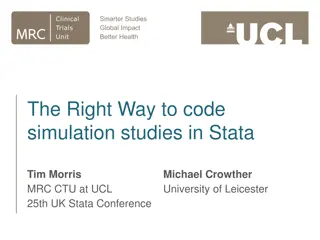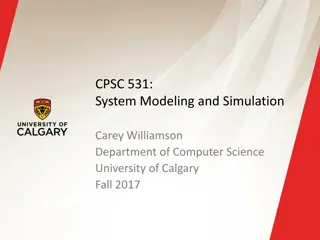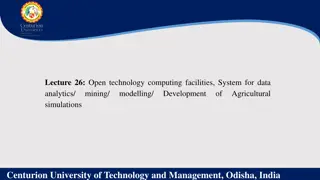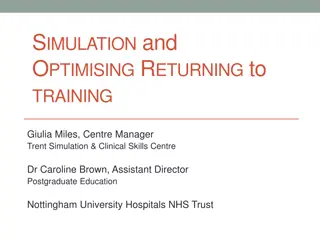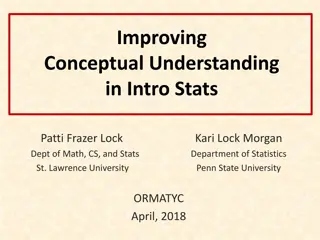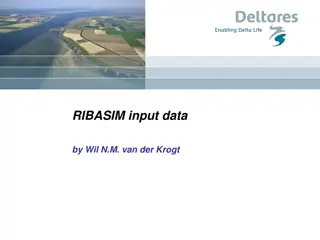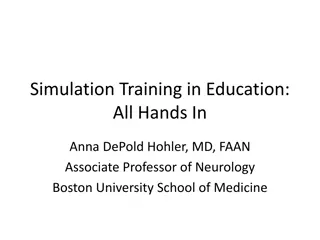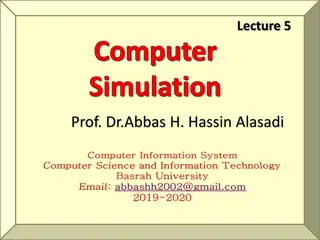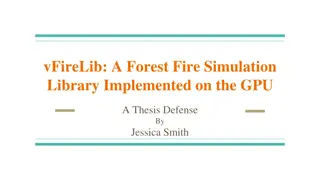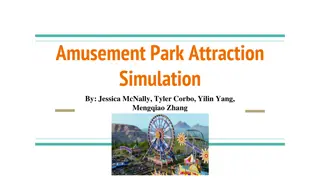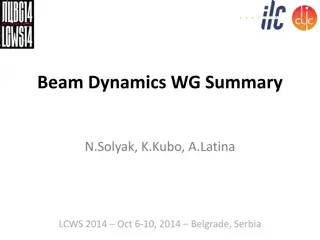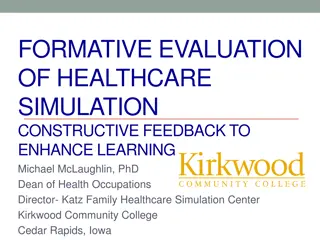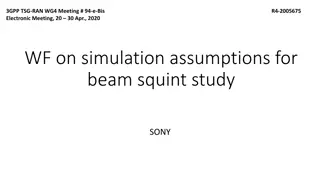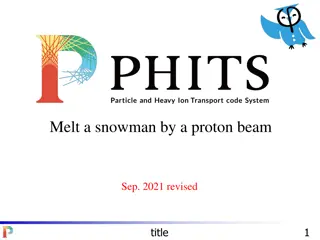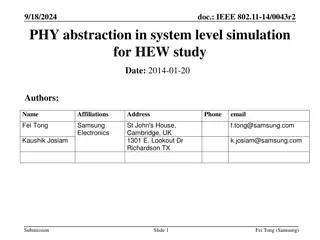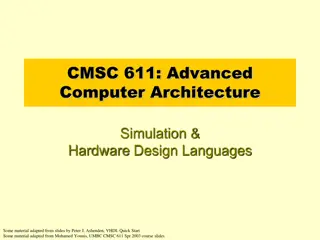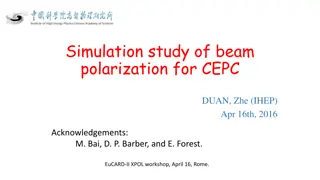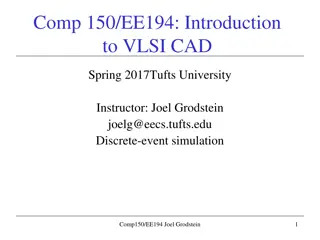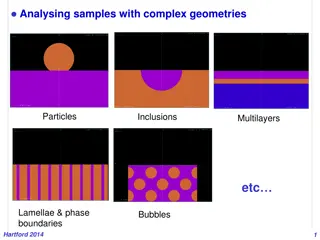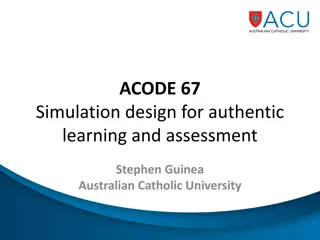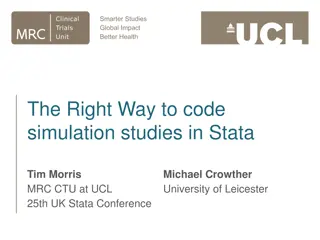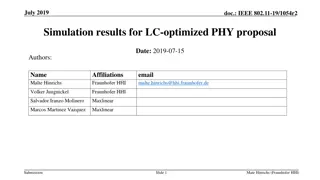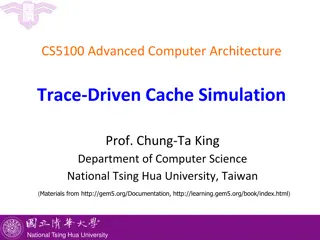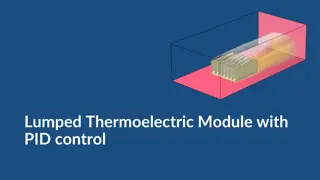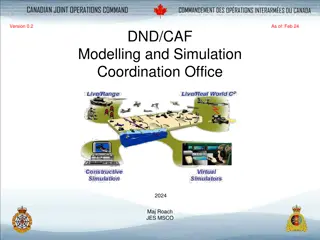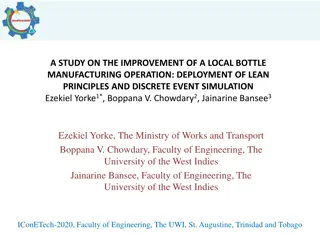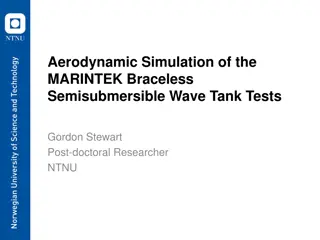TCAD simulation I
TCAD simulation plays a crucial role in the semiconductor industry, allowing for process and device simulations to meet market demands and reduce development time and costs. This involves modeling transport regimes, semiconductor equations, and electromagnetic fields to drive charge flow self-consis
2 views • 29 slides
Computer Organization and Architecture
A computer system is a programmable digital electronics device that processes data as per program instructions to provide meaningful output. It comprises hardware and software components, with hardware being the physical parts and software essential for driving the hardware. Computer organization fo
15 views • 71 slides
System Modeling and Simulation Course Overview
This course covers the basics of systems modeling, discrete-event simulation, and computer systems performance evaluation. Topics include Monte Carlo simulation, probability models, simulation output analysis, queueing theory, and more. Professor Carey Williamson leads the course with a focus on pra
4 views • 21 slides
Analog Computer Simulation of Mechanical Oscillations with Damping
Explore the analog computer simulation of mechanical oscillations with and without damping in a physics-themed project. Students can visualize classical physics concepts through hands-on analog circuit design, modeling spring-mass systems and RLC circuits. The project involves constructing a breadbo
0 views • 11 slides
Overview of Army Modeling and Simulation Office
The U.S. Army Modeling and Simulation Office (AMSO) serves as the lead activity in developing strategy and policy for the Army Modeling and Simulation Enterprise. It focuses on effective governance, resource management, coordination across various community areas, and training the Army Analysis, Mod
2 views • 8 slides
Simulation-Based Training for Diabetes Care in Nursing
This simulation program, SCENS, focuses on enhancing nursing skills in managing diabetes-related complications such as hyper/hypoglycemia. The learning objectives include assessment, safe care provision, insulin administration, and effective communication. The simulation addresses the significant im
0 views • 17 slides
Computer Architecture and Organization
Computer architecture and organization are fundamental aspects of computing systems. Computer architecture focuses on the functional design and implementation of various computer parts, while computer organization deals with how operational attributes come together to realize the architectural speci
3 views • 40 slides
Computer Science Department Information and Courses Offered
The Computer Science Department provides information on courses offered for GCSE or BTEC qualifications, specifically focusing on the AQA GCSE in Computer Science. The course equips students with valuable thinking and programming skills essential in the modern workplace, covering key concepts and pr
3 views • 7 slides
How to Check a Simulation Study: Methods and Considerations
Simulation studies are often used to evaluate statistical methods and study power, but they can sometimes produce misleading results. This work discusses strategies to assess and improve the quality of simulation studies, drawing on experiences and considerations outlined in relevant literature. A s
0 views • 31 slides
Coding Simulation Studies in Stata: A Practical Approach
Understanding simulation studies and their importance in evaluating statistical methods, this presentation delves into the precise coding techniques required in Stata to generate simulated datasets, produce estimates, and analyze performance metrics. With a focus on consistent terminology, data-gene
6 views • 18 slides
Monte Carlo Transport Simulation
Monte Carlo simulation is a stochastic technique that uses random numbers and probability statistics to investigate and solve problems. In the context of transport simulation, a Monte Carlo program simulates the passage of particles through matter, involving geometry, transport, visualization, detec
1 views • 11 slides
Evolution of Algorithms and Computer Science Through History
The history of algorithms and algorithmic thinking dates back to ancient times, with the development of general-purpose computational machines by Charles Babbage in the 19th century marking a significant advancement. The term "computer science" emerged in 1959, encompassing theoretical computer scie
1 views • 39 slides
System Modeling and Simulation Overview
This content provides insights into CPSC 531: System Modeling and Simulation course, covering topics such as performance evaluation, simulation modeling, and terminology in system modeling. It emphasizes the importance of developing simulation programs, advantages of simulation, and key concepts lik
1 views • 28 slides
Developing Agricultural Simulation System Using Data Mining Techniques
Development of an agricultural simulation system involves identifying data sources, collecting and integrating data, preprocessing, applying data mining techniques, developing simulation models, calibration, validation, and optimization for performance. User interface development and deployment are
0 views • 4 slides
Enhancing Training Through Simulation Techniques and Optimizing Performance
Simulation techniques play a crucial role in training programs, offering guided experiences that replicate real-world scenarios. By understanding learners' needs, fostering a safe environment, and facilitating debrief sessions, organizations can enhance clinical and procedural skills, teamwork, and
2 views • 12 slides
Enhancing Introductory Statistics through Simulation Methods
Explore innovative ways to improve the Introductory Statistics course by enhancing student understanding, success rates, and faculty enjoyment. Discover how simulation methods can reduce prerequisites, increase student engagement, and improve learning outcomes through hands-on workshops and keynote
1 views • 30 slides
Basin Manipulation Simulation Analysis Tool Overview
Basin Manipulation Simulation Analysis Tool provides a comprehensive solution for managing and analyzing basin data, including tasks like basin manipulation, simulation analysis, case management, and defining simulation time steps. The tool allows for easy data entry, visualization of simulation res
4 views • 17 slides
Simulation Training in Education: Enhancing Learning Through Hands-On Simulation
Hands-on simulation training in education provides students with valuable learning experiences by increasing self-reported knowledge and technical proficiency. Simulations help improve students' knowledge, experience, and comfort with challenging procedures in a lower-risk environment, leading to en
0 views • 13 slides
Computer Simulation and Modeling Tools
Computer simulation and modeling is essential for conducting studies in various fields. Selecting the right simulation language or package is crucial for accurate results. This involves considering the characteristics of the language, such as random number generation, process transformers, list proc
2 views • 7 slides
vFireLib: Forest Fire Simulation Library on GPU
Dive into Jessica Smith's thesis defense on vFireLib, a forest fire simulation library implemented on the GPU. The research focuses on real-time GPU-based wildfire simulation for effective and safe wildfire suppression efforts, aiming to reduce costs and mitigate loss of habitat, property, and life.
0 views • 95 slides
Amusement Park Attraction Simulation Project Overview
This project focuses on optimizing an amusement park attraction through simulation modeling using Simio. Objectives include adjusting system parameters to enhance ride efficiency, improve customer throughput, and maximize utilization of the presentation room. Key performance measures center around m
0 views • 20 slides
Computer Crimes and Prevention Strategies
Computer crimes involve illegal acts utilizing computer systems, leading to various consequences. This lecture covers the types of computer system attacks, motives behind computer crimes, costs, prevention strategies, and reflection on the discussed topics. It emphasizes the increasing scope of comp
1 views • 20 slides
Advanced Beam Dynamics and Machine Protection in High-Energy Linacs
Overview of recent talks and discussions at LCWS 2014 in Belgrade, Serbia, focusing on machine protection, simulation codes, instrumentation, and system tests. Topics include beam-loss monitors, dark current measurements, simulation code developments, and beam dynamics studies in linacs. Key speaker
1 views • 12 slides
Enhancing Healthcare Simulation Through Constructive Feedback
Explore the principles and benefits of healthcare simulation, focusing on formative evaluation and constructive feedback to improve learning outcomes. Delve into the role of formative assessment tools, TeamSTEPPS model, and Mayo High Performance Teamwork Scale in simulation scenarios. Discover the s
1 views • 37 slides
Simulation Assumptions and Performance Degradation Study on Beam Squint in 3GPP Meeting
Background on beam squint in conducted power of transmitted CCs causing radiative domain impairment and gain droop, with a problem statement on degradation of CC2 spherical coverage when CC1 and CC2 are separated by frequency. The study involves refined simulation assumptions to quantify radiative d
0 views • 7 slides
Proton Beam Simulation for Melting Snowman in Gundam Analysis
Conducting a proton beam simulation to analyze the feasibility of the beam rifle in Gundam by melting a snowman. The exercise involves setting up geometry, defining parameters, sources, materials, and cells, and calculating energy deposition. Follow the flow chart to determine beam current and power
0 views • 19 slides
System-Level Simulation for HEW Study in IEEE 802.11-14/0043r2
This document discusses abstraction in system-level simulation for High-Efficiency Wireless (HEW) study, focusing on effective Signal-to-Noise Ratio (SNR) mapping, parameter fitting, selection of mapping functions, and simulation conditions/assumptions for IEEE 802.11. The study explores various met
0 views • 25 slides
Advanced Computer Architecture Simulation & Hardware Design Languages
Delve into the realms of advanced computer architecture through simulation and hardware design languages. Explore topics such as behavioral correctness, timing simulations, functional and structural modeling, geometric and algorithmic approaches, and the use of hardware design languages for behavior
0 views • 38 slides
Beam Polarization Simulation Study for CEPC
Simulation study on beam polarization for the Circular Electron Positron Collider (CEPC) using the PTC Poly- morphic Tracking Code. The study includes orbital and spin tracking, equilibrium polarization calculation, and Monte-Carlo simulation of depolarization rate. Comparison with other Monte-Carlo
1 views • 20 slides
Introduction to VLSI CAD and Discrete-Event Simulation at Tufts University
This course introduces students to event-oriented simulation, building virtual models, and validating designs through simulation. It covers the importance of simulation in testing and refining designs before implementation. Examples include simulating VLSI networks and exploring the use of discrete-
0 views • 32 slides
Advanced Simulation Techniques for Analyzing Samples with Complex Geometries
Explore the capabilities of PENELOPE simulation software for analyzing samples with intricate structures like particles, inclusions, multilayers, lamellae, and phase boundaries. The software facilitates detailed investigations of material composition and electron-photon transport in diverse geometri
0 views • 28 slides
Simulation Design for Authentic Learning and Assessment at ACU
Simulation design for authentic learning and assessment is a crucial aspect of education, particularly in the healthcare field. At the Australian Catholic University (ACU), simulation plays a significant role in providing students with authentic experiences that bridge the gap between theory and pra
0 views • 18 slides
The Right Way to Code Simulation Studies in Stata
Simulation studies in Stata involve using (pseudo) random numbers to generate data from a distribution for studying statistical methods. This process helps to evaluate different scenarios and understand the properties of statistical techniques. Key components like ADEMP (Aims, Data-generating mechan
3 views • 18 slides
Simulation Results for LC-Optimized PHY Proposal in July 2019
The document presents simulation results for an LC-optimized PHY proposal for TGbb based on G.9991 PHY. It includes details on the simulation setup, frame detection results, header modulation, coding simulation results, payload modulation, and coding simulation results. The setup involved various re
0 views • 18 slides
Trace-Driven Cache Simulation in Advanced Computer Architecture
Trace-driven simulation is a key method for assessing memory hierarchy performance, particularly focusing on hits and misses. Dinero IV is a cache simulator used for memory reference traces without timing simulation capabilities. The tool aids in evaluating cache hit and miss results but does not ha
0 views • 13 slides
Thermoelectric Module with PID Control Simulation
This simulation showcases a lumped thermoelectric module with PID control. The model evaluates the performance of a thermoelectric element in a nonisothermal fluid flow around a heat sink. A stationary simulation assesses the module's capabilities, followed by a transient simulation with a PID contr
0 views • 7 slides
Defense Modeling and Simulation Coordination Office Overview
The Defense Modeling and Simulation Coordination Office (DND/CAF MSCO) is responsible for managing contractors, policies, and strategic activities related to modeling and simulation within the Canadian Armed Forces. The office focuses on supporting various organizations and enhancing capabilities th
2 views • 6 slides
Enhancing Local Bottle Manufacturing through Lean Principles and Simulation
This study focuses on improving a local bottle manufacturing operation by implementing Lean principles and discrete event simulation. It addresses challenges in the industry, presents a case study of an SME bottle manufacturer, and explores opportunities for enhancement through computer simulation u
0 views • 17 slides
Aerodynamic Simulation of MARINTEK Braceless Semisubmersible: Insights and Tools
Explore the aerodynamic simulation of the MARINTEK Braceless Semisubmersible through advanced techniques and tools. Discover the unique aerodynamic actuator, simulation models, and tools used in the research conducted by Gordon Stewart, a post-doctoral researcher at NTNU. Gain insights into the expe
0 views • 16 slides
Simulation Types for Ecosystem Modeling
Exploring different simulation types such as continuous and discrete event simulations for modeling complex systems like ecosystems. Detailed discussion on creating an ecosystem simulation with fish and bears on a grid, showcasing actions like breeding, moving, eating, and dying. Overview of a World
0 views • 31 slides
